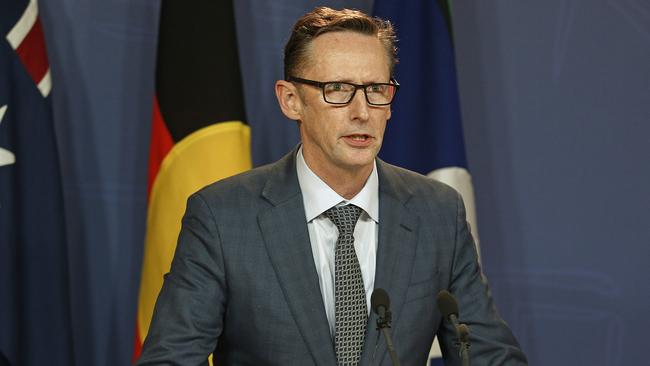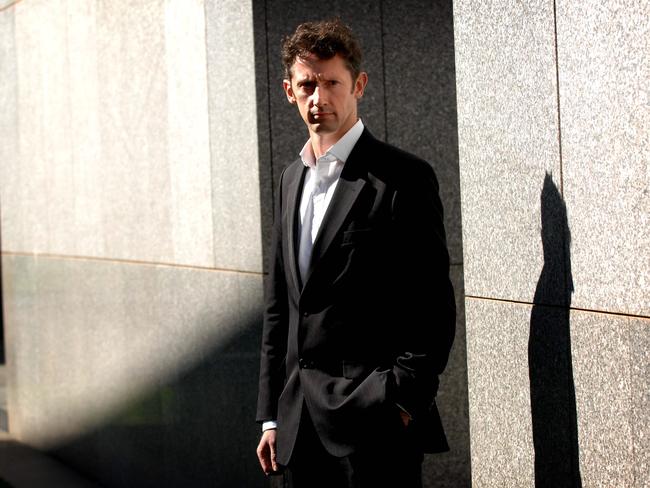Stephen Jones looks to his legacy as retirement looms
As Stephen Jones approaches his retirement from politics, he says some issues remain unresolved in the financial services sector and must be dealt with by the next government.

Business
Don't miss out on the headlines from Business. Followed categories will be added to My News.
Stephen Jones is preparing to retire from politics, but the Assistant Treasurer warns the benefits of the Albanese government’s work will only be seen clearly in the years to come.
Mr Jones, who is preparing to retire from parliament after 15 years on the green benches, tells The Australian he is acutely aware of the problem of legacy in government, which bequeaths both problems to solve – and solutions for others to benefit from.
The 59-year-old, who has been the face of many of the Albanese government’s forays into financial services over the past three years, says he hopes to leave the sector “fit for purpose for the digital age”.
But Mr Jones, who is also Financial Services Minister, cautions “legacies are for the truly great”, noting ministers who oversee Australia’s financial sector should instead look to be “good custodians”.
The three years of the Albanese government have seen the federal government introduce or implement a series of key initiatives, and steer programs kicked off under the previous Coalition governments into the market.
This includes the launch of the Compensation Scheme of Last Resort, as well as wars with tech giants over the news media bargaining code.
The superannuation rate has also ticked up over the term of government, lifting from 9.5 per cent in 2021 and set to hit 12 per cent by July this year.
Flagship work on scams and fraud is set to take shape in the coming year, after passing parliament on February 13, in what may prove among the last legislation of the Albanese government.

Mr Jones acknowledges that despite these key pieces of legislation, the Albanese government’s vision for reform in financial services has been frustrated, not only by the electoral rigours of squeezing legislation through a contested upper house, but also by a shortage of expertise.
A key issue has been the prioritisation of legislation drafters, which – despite the government floating potential reforms across a multitude of areas – has frustrated his plans. Mr Jones said it was “mind-boggling” and “bizarre that the absence of lawyers in the Office of Parliamentary Counsel was in a very real or practical way halting or delaying the process of government”.
“The inability to get regulation drafted and rules drafted in a timely fashion is dictating the tempo of government,” he said.
Mr Jones pointed to the work of the Fraser government and the 1979 Campbell report, which scrutinised Australia’s staid financial system.
The following Hawke-Keating government set about implementing many of these reforms.
“Sometimes we pick stuff up we found, other times we start stuff and don’t have time to see it through, and other times we start stuff and finish it,” Mr Jones said.
“I’m lucky enough to have got stuff in each of those columns.”
Mr Jones points to the legislated lift in superannuation under the Gillard government in 2013 as an example of its legacy, noting it had set up many Australians to enjoy a “decent retirement”. He said 12 per cent was the “right” level for retirement savings, but that there might be further debate about raising it.
“Nailing 12 per cent and letting the economy and small business settle into that is an important thing to do,” he said.
“The priority is to make all the superannuation owed be paid.”
But Mr Jones said the last few years had shown there was unfinished work in the sector, pointing to recent regulatory attention on claims servicing.

The Australian Securities & Investments Commission has sued superannuation fund Cbus, alleging the industry giant was remiss when its members struggled to get service from its outsourced provider Link, owned by Japanese financial giant MUFG.
“(The sector) has been really bad in the way they deal with and service members who own that money,” Mr Jones said.
Link services a swath of the regulated superannuation sector, and Mr Jones said that despite him raising the concentration of funds administration with both Treasury and the Australian Prudential Regulation Authority “on a number of occasions”, little had changed and no action taken to address it.
He said the superannuation sector must look to bring its claims servicing function in-house.
“I don’t think (outsourcing) is a sustainable model moving forward,” he said.
The Assistant Treasurer said that after a string of recent scandals, it was time for a mandatory code of conduct for the superannuation sector.
The last year has seen a number of superannuation players criticised for poor behaviour, including giant Australian Super which was most recently handed a $27m fine after knowingly failing to deal with double-ups of accounts.
Australian Super members will now be left to foot the bill through increased fees. ASIC is also suing Cbus, but Mr Jones said not all the problems at the fund could be slated home to its leadership under former treasurer Wayne Swan.
“To be fair to Wayne, when he came into the fund a lot to these problems were well and truly baked in,” he said.
“It’s a problem across the industry where they just have not put enough focus on their interactions with members.”
Mr Jones pointed to the reforms from the government in financial advice, including handing super funds powers to charge for and offer the service, as unfinished work.
He noted the draft laws for a second stage of reforms would probably emerge in the coming weeks, but with expectations an election will be called any day they may be left to be picked up by the next parliament.
“I think we’ve created sufficient momentum,” Mr Jones said.
He said to financial advice as a realm where governments must undo the work of past administrations, who overreached in the face of scandal in the sector.
The Albanese government had kicked off the project of looking at regulations put in place over the past 15 years.
“All of them well-intentioned, all of them to protect consumers from bad advice, but what they’ve done is protect consumers from good advice.”
In one form or another Mr Jones has represented the voters of Wollongong since being elected in 2010.

The former CPSU national secretary said much of the inspiration for the Albanese government’s fervour in its fight on scams and fraud came from his experience of the Covid-19 lockdowns, which saw Mr Jones and his constituents and many others barraged with an array of fake messages, spurious social media posts, and a lot of “bullshit”.
Mr Jones is scornful of the failures of the social media and search companies, which have surged in prominence in recent years.
Past governments failed to see this coming, he said, and said the failure to take action had seen legacy media wither.
Mr Jones said social media companies showed carelessness and indifference, and the telecommunications sector also failed to stop the misuse of their systems by scammers and fraudsters.
He described Meta, owner and operator of Facebook, WhatsApp, and Instagram, as the worst behaved of the tech giants.
“This is not a start-up business; this is a business with some of the best technology in the world,” he said.
But Mr Jones said Australia couldn’t arrest its way out of the problem, pointing to the government’s collective efforts co-ordinating the banking, telco, and social-search sector along with empowering regulators to act, as the answer.
The new scam codes are intended to impose financial penalties on players in the three sectors, should they fail to take action to stop the financial crime.
Mr Jones said the scams issue had been a blind spot for the Morrison government.
He said the rise of card surcharging was also an issue that had “got away” from past government and regulators.
“There hasn’t been sufficient attention placed on the true cost of these transactions and what a reasonable margin looks like,” Mr Jones said.
The father of two pointed to a series of past governments and regulators as failing to appreciate the significance of their action or inaction, both in financial services and in the broader economy.
He pointed to the massive run-up in the Aussie dollar, which between 2010 and 2014 traded aggressively high during the mining boom, resulting in the wipe-out of industry from parts of the country.
“It had a devastating effect on parts of the electorate I represent,” he said.
“On some of those core economic issues the hens came home to roost about a decade later as we hit the Covid social and economic crisis.”
Originally published as Stephen Jones looks to his legacy as retirement looms





